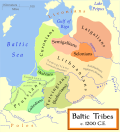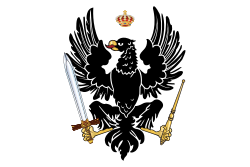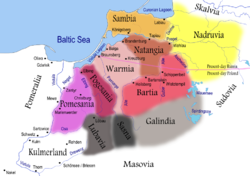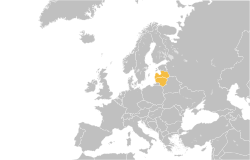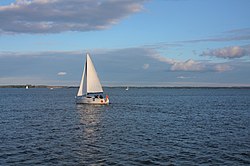Prussians, the Baltic peoples of the Prussian region. The language is called Old Prussian to avoid confusion with the German dialects of Low Prussian...
46 KB (4,270 words) - 03:25, 18 May 2025
Old Prussians, Baltic Prussians or simply Prussians were a Baltic people that inhabited the region of Prussia, on the southeastern shore of the Baltic...
36 KB (4,020 words) - 21:37, 25 March 2025
Yotvingian, or Jatvingian) was a West Baltic language of Northeastern Europe. Sudovian was closely related to Old Prussian. It was formerly spoken southwest of...
25 KB (2,484 words) - 19:00, 23 March 2025
of Baltic languages, along with East Baltic. It includes Old Prussian, Sudovian, West Galindian, possibly Pomeranian Baltic, Skalvian and Old Curonian...
14 KB (1,249 words) - 06:33, 28 March 2025
Silesia and Thuringia, and was influenced by the Baltic Old Prussian language. High Prussian is a Central German dialect formally spoken in Prussia. It...
27 KB (2,743 words) - 11:30, 11 April 2025
Masurian dialects (redirect from Prussian Masurian language)
remaining Polish language area. The Masurian dialect group has many Low Saxon, German and Old Prussian words mixed in with Polish-language endings. Beginning...
41 KB (3,187 words) - 09:33, 31 March 2025
Prussia (region) (redirect from Prussian lands)
Sudo. The Old Prussians spoke a variety of languages, with Old Prussian belonging to the Western branch of the Baltic language group. Old Prussian, or related...
67 KB (7,176 words) - 02:37, 16 May 2025
supplanted Old Prussian, which became extinct in the early 18th century. Simon Dach's poem Anke van Tharaw was written in Low Prussian. Low Prussian is a Low...
17 KB (1,385 words) - 16:54, 2 April 2025
Kingdom of Prussia (redirect from Prussian kingdom)
country as a European great power through the victories of the powerful Prussian Army. Prussia made attempts to unify all the German states (excluding the...
75 KB (7,983 words) - 10:15, 11 May 2025
Pomeranian language. It is close to standard Polish with influence from Low German and the extinct Polabian (West Slavic) and Old Prussian (West Baltic)...
51 KB (4,552 words) - 00:24, 6 May 2025
East Prussia (redirect from East Prussian)
In 1525, with the Prussian Homage, the territory became the Duchy of Prussia, a vassal duchy of Poland. The Old Prussian language had become extinct...
97 KB (8,965 words) - 21:29, 3 May 2025
Christianize under duress the pagan Old Prussians. Invited after earlier unsuccessful expeditions against the Prussians by Christian Polish princes, the...
38 KB (4,677 words) - 21:34, 10 May 2025
Prussia (disambiguation) (redirect from Prussian people)
of Prussia Old Prussian language, language of the Old Prussians, now extinct High Prussian, German dialect in East Prussia Low Prussian, German dialect...
3 KB (505 words) - 01:31, 13 May 2025
indigenous language is guaranteed by Latvian law A few linguists and philologists are involved in reviving a reconstructed form of the extinct Old Prussian language...
100 KB (11,179 words) - 22:47, 16 May 2025
Bartians (category Old Prussians)
The Prussians were forcibly assimilated by the invaders and the Old Prussian language became extinct by the end of the 17th century. Several years of...
6 KB (677 words) - 17:30, 2 February 2023
Natangians (category Old Prussians)
the southeast. They likely spoke a West Baltic language, now extinct, similar to Old Prussian language. Natangians are first mentioned in a 1238 treaty...
5 KB (576 words) - 14:55, 27 October 2024
Warmians (category Old Prussians)
as other countries of Europe. The Prussians were eventually assimilated by the colonists and the Old Prussian language became extinct by the end of the...
7 KB (795 words) - 00:59, 27 October 2024
Ural Mountains, but this hypothesis has been questioned. Old Prussian, a Western Baltic language that became extinct in the 18th century, had possibly conserved...
50 KB (4,987 words) - 03:51, 7 May 2025
Prussian virtues (German: preußische Tugenden) are the virtues associated with the historical Kingdom of Prussia (1701–1918). They were derived from Prussia's...
21 KB (2,408 words) - 03:48, 20 March 2025
The Prussian Lithuanians, or Lietuvininkai (singular: Lietuvininkas, plural: Lietuvininkai), are Lithuanians, originally Lithuanian language speakers,...
38 KB (3,993 words) - 23:11, 10 December 2024
The Prussian Union of Churches (known under multiple other names) was a major Protestant church body which emerged in 1817 from a series of decrees by...
254 KB (32,658 words) - 09:14, 15 May 2025
Pogesanians (category Old Prussians)
as the rest of the Prussians, were conquered by the Teutonic Knights and became Germanized or Polonized. The old Prussian language became extinct sometime...
6 KB (709 words) - 12:33, 27 October 2024
Yotvingians (category Articles containing Lithuanian-language text)
pour. Numerous linguists consider the Yotvingian language as a dialect of the Old Prussian language. The Lithuanian linguist Petras Būtėnas states that...
15 KB (1,487 words) - 05:27, 3 May 2025
Motława (category Articles containing German-language text)
run since the year 1687. The Polish name Motława is derived from Old Prussian language. In German the river is known as Mottlau. A common theory for the...
3 KB (225 words) - 09:54, 6 May 2025
Baltic and Slavic languages have more in common that others: Old Prussian and Latvian share more commonalities with Slavic languages than Lithuanian does...
100 KB (6,679 words) - 07:24, 1 January 2025
Baltiysk (category Articles containing Russian-language text)
"Pil" in several documents, possibly taking its name from pils the Old Prussian language word for fort. It was eventually conquered by the Teutonic Knights...
19 KB (2,024 words) - 17:26, 6 May 2025
Masuria (category CS1 Polish-language sources (pl))
lightly populated area. Inhabitants of the now Masuria spoke a language now known as Old Prussian and had their own mythology. Although a 19th-century German...
84 KB (9,057 words) - 22:21, 7 May 2025
Königsberg (category Articles containing Prussian-language text)
Kaliningrad, Russia. The city was founded in 1255 on the site of the small Old Prussian settlement Twangste by the Teutonic Knights during the Baltic Crusades...
99 KB (10,544 words) - 07:20, 20 April 2025
Drang nach Osten (category Articles containing German-language text)
and the Church. The future state of Prussia, named for the conquered Old Prussians, had its roots largely in these movements. As the Middle Ages came to...
19 KB (2,124 words) - 18:25, 22 March 2025
Royal Prussia (category CS1 Polish-language sources (pl))
Albrecht decreed that Luther's Catechism was to be translated into the Old Prussian language, Polish, and Lithuanian, so that the creed could unite the people...
27 KB (3,185 words) - 10:23, 21 April 2025


